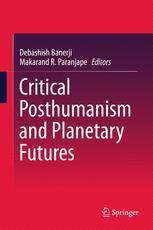

Most ebook files are in PDF format, so you can easily read them using various software such as Foxit Reader or directly on the Google Chrome browser.
Some ebook files are released by publishers in other formats such as .awz, .mobi, .epub, .fb2, etc. You may need to install specific software to read these formats on mobile/PC, such as Calibre.
Please read the tutorial at this link: https://ebookbell.com/faq
We offer FREE conversion to the popular formats you request; however, this may take some time. Therefore, right after payment, please email us, and we will try to provide the service as quickly as possible.
For some exceptional file formats or broken links (if any), please refrain from opening any disputes. Instead, email us first, and we will try to assist within a maximum of 6 hours.
EbookBell Team

4.1
90 reviewsThis volume is a critical exploration of multiple posthuman possibilities in the 21st century and beyond. Due to the global engagement with advanced technology, we are witness to a species-wise blurring of boundaries at the edge of the human. On the one hand, we find ourselves in a digital age in which human identity is being transformed through networked technological intervention, a large part of our consciousness transferred to "smart" external devices. On the other hand, we are assisted---or assailed---by an unprecedented proliferation of quasi-human substitutes and surrogates, forming a spectrum of humanoids with fuzzy borders. Under these conditions, critical posthumanism asks, who will occupy and control our planet: Will the "superhuman" merely serve as another sign under which new regimes of dominance are spread across the earth? Or can we discover or invent technologies of existence to counter such dominance? It is issues such as these which are at the heart of this new volume of explorations of the posthuman. The essays in this volume offer leading-edge thought on the subject, with special emphases on postmodern and postcolonial futures. They engage with questions of subalternity and feminism vis-à-vis posthumanism, dealing with issues of subjugation, dispensability and surrogacy, as well as the possibilities of resistance, ethical politics or subjective transformation from South Asian archives of cultural and spiritual practice. This volume is a valuable addition to the on-going global dialogues on posthumanism, indispensable to those, from across several disciplines, who are interested in postcolonial and planetary futures.